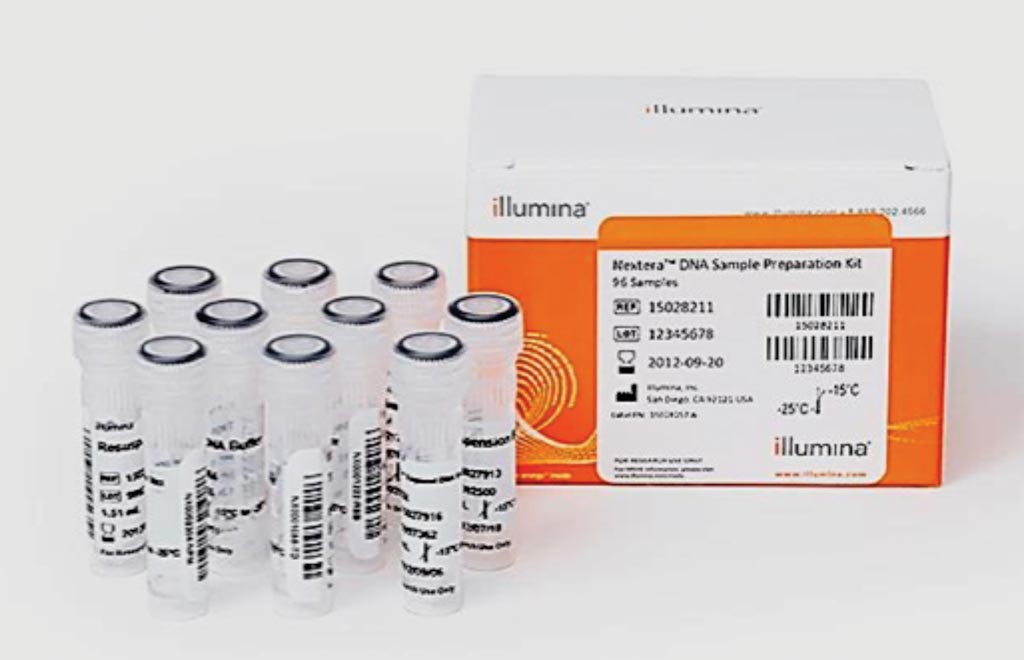Gene Missense Variant Associated with Crohn's Disease
By LabMedica International staff writers
Posted on 21 Feb 2019
Gene-microbiome interactions are important in etiology and pathogenesis of inflammatory bowel disease, a chronic inflammatory disorder of the gastrointestinal tract consisting of Crohn’s disease and ulcerative colitis. This latter condition causes long-lasting inflammation and sores (ulcers) in the innermost lining of the large intestine (colon) and rectum.Posted on 21 Feb 2019
Inflammatory bowel disease (IBD) is a common, chronic disorder of the gastrointestinal tract. Patients with this disease experience periods of inflammation alternated by periods of remission. The most common subgroups of IBD are Crohn’s disease (CD), ulcerative colitis (UC) and inflammatory bowel disease undetermined (IBDU). The inflammation caused by Crohn's disease often spreads deep into the layers of affected bowel tissue.

Image: The Nextera DNA Library Preparation Kit (Photo courtesy of Illumina).
Scientists at the University of Groningen (Groningen, The Netherlands) and their colleagues collected fecal samples, peripheral blood and extensive phenotype data from 291 patients with inflammatory bowel disease comprising 171 patients with CD, 104 patients with UC and 16 patients with IBDU and 476 healthy controls. For each participant, peripheral blood samples stored in EDTA tubes were available.
DNA extraction was performed using the Autopure LS with Puregene chemistry. Sample preparation was done by using Illumina Nextera prep kit and enrichment of the exonic sequences was performed by hybrid capture using Illumina rapid Capture Enrichment (37 mb target). The gut microbiome composition of stool samples was determined using tag-sequencing of the 16S rRNA gene. Fecal DNA was isolated by making aliquots and for the isolation of microbial DNA the Qiagen AllPrep DNA/RNA Mini Kit was used. Illumina MiSeq paired-end sequencing of the V4 region of the 16S rRNA gene was performed. The association between the SLC39A8 [Thr]391 risk allele and gut microbiome composition in patients with inflammatory bowel disease and healthy controls was inferred.
The team reported that Crohn’s disease patients were more often carriers of the missense variant (21/171, 12.3%) than controls (30/476, 6.3%) (OR = 2.1). They could not identify associations between carrier status and overall gut microbiome composition and microbial richness in all tested groups after correcting for potential confounding factors. They did identify 37 different operational taxonomical units to be associated with carrier status among the tested groups. Two of these 37 were identified before in the discovery study.
The authors concluded that that in future gene-microbiome studies much larger sample sizes, more stringent statistical analyses, especially with regard to mean counts of operational taxonomic units (OTUs) and correcting for confounding factors, replication in independent cohorts and elaborate descriptions of the methods used are needed to pinpoint genome-microbiome associations in both IBD and HC. They could identify the genetic variant to be associated with Crohn's disease, though the impact on the microbiome composition was limited to a few OTUs. The study was published on January 31, 2019, in the journal PLOS ONE.
Related Links:
University of Groningen














